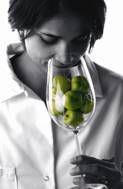
Latest research designed to boost scientific understanding of fruit genes looks set to transform the way a whole host of food and other products are created.
Researchers at New Zealand’s HortResearch have developed the science of gene discovery to such a degree that they can now accurately determine which genes create the individual flavours and fragrances found in fruits and flowers. It could spell the end for synthetic flavours and fragrances in products ranging from ice cream to shampoo and in turn reduce the reliance on fossil fuels in the manufacturing process or the expensive extraction method.
Bio-fermentation however can produce large amounts of a desired compound at a low cost and with little environmental impact. And because bio-fermentation uses the actual genes that plants use in the wild, the resulting flavour or fragrance compound has exactly the same molecular make-up. It is, according to HortResearch’s industrial biotechnology scientist Richard Newcomb “nature identical”.
While the possibility of fermenting genes to produce compounds has been well understood for many years, science has generally lagged behind in identifying which genes are needed to produce the desired outcome. HortResearch has now overcome this issue by using research initially intended to speed up the process of fruit breeding, said Dr Newcomb.
“Through decades of fruit-breeding research HortResearch has developed extensive fruit gene and compound databases,” he said. “Now we have developed techniques that help determine which genes create each compound, and how those compounds combine to create a flavour or fragrance. It is a complicated and time-consuming process - some fruit flavours for example may be comprised of over thirty different compounds, each in a precise volume.
HortResearch has proven the bio-production concept can be used to produce fruit flavours and fragrances by perfectly recreating a fruit compound called alpha-farnesene, responsible for the distinctive aroma of green apples.
The company has filed international patent applications on the use of the applicable gene in creating the fragrance, and for another plant gene responsible for making a compound that smells like the heady scent of red roses.
Dr Newcomb says HortResearch scientists are continuing to seek new gene/compound combinations that they believe will find ready demand in the marketplace.
“Researchers are finding ever greater numbers of foods and food compounds that can enhance human heath and wellbeing. The trouble is, they don’t always taste very good - and until they do it will be difficult to encourage consumers to make them part of their regular diet,” he says.
“Adding synthetic flavours destroys the credibility of any health food, so natural flavours produced through bio-production would be a huge advantage to the health industry.”



